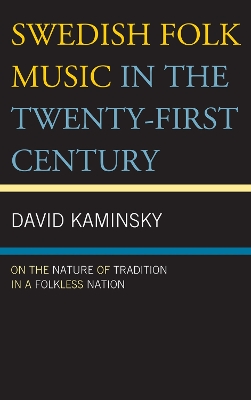In applying the term "folk music" to the music they were collecting, early nineteenth-century Swedish folklorists saturated it with the cultural currency of romantic nationalism. These collectors promoted the music as the essence of the rural peasant folk, and thus of the nation; the tradition it represented was ancient, invested with the power of nature itself. Since that time, "folk music" has retained its symbolic value, while at the same time the national romantic narrative has broken down due to its being politically problematic as well as factually unsustainable. Research that has been done on rural peasant music in the intervening years reveals that it was never particularly ancient nor nationally uniform, nor truly distinguishable from "popular" or "art" musics.
Swedish Folk Music in the Twenty-First Century: On the Nature of Tradition in a Folkless Nation, by David Kaminsky, examines the struggle of present-day Swedish folk musicians and dancers to maintain the cultural currency of their genre while simultaneously challenging the historical fallacies and ideological agenda upon which that currency was originally based. The notion of Swedish cultural purity once championed by nineteenth-century folklorists has been dismissed by serious scholars and now marks the discourse of the anti-immigrant extreme right, alienating it from the academic-savvy center/left-leaning folk music subculture of today. Kaminsky's study is especially relevant today, given the rise of the anti-immigrant extreme right in Sweden, and their efforts to preserve culturally "pure" Swedish folk music at the expense of existing multicultural government initiatives.
- ISBN10 0739167227
- ISBN13 9780739167229
- Publish Date 15 December 2011
- Publish Status Active
- Publish Country US
- Imprint Lexington Books
- Format Hardcover
- Pages 200
- Language English
